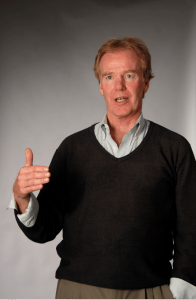Peter Senge Urges Collaboration on Sustainability Efforts
Topics
What would it take to get rid of disposable cups? That was a question MIT Sloan senior lecturer Peter Senge raised in an interesting keynote address this morning at the MIT Sustainability Summit 2010.
Senge, who is the author of well-known books such as The Fifth Discipline and The Necessary Revolution, focused on the need for collaboration among unlikely partners to achieve real progress on sustainability issues — and convert our “take-make-waste” economy into a new, more sustainable economy.
Senge used the example of disposable coffee cups (a topic apparently on his mind because he came to the Sustainability Summit from a Starbucks-convened cup summit taking place down the street) to get the MIT Sustainability Summit attendees thinking about the need for collaboration in sustainability projects.
Senge asked the audience: Who would have to work together to eliminate disposable cups? The answers suggested include everyone from Starbucks and its competitors to paper manufacturers, food service providers, recyclers and municipal governments.
To make real headway on really tough sustainability issues is a “massive undertaking in collaboration,” Senge explained. What’s more, he pointed out, the parties that need to collaborate often aren’t naturally inclined to — such as competitors in the same industry who need to work together or nongovernmental organizations who need to work with corporations.
A good guy/bad guy mentality can be a barrier to such collaboration. Concluded Senge:
“You’ve got to wake up and say ‘We’re all part of the system.’ You know who is causing the destruction of species? You and me. You know who’s causing the huge waste problems around the world? You and me.”
Once you reach that type of realization, Senge suggested, “you become more open-minded.” His advice?
“Look for small steps of things you can do together with people with whom you traditionally would never have cooperated — and do something useful, no matter how small.”
Related article: For more on Senge’s ideas about sustainability, read MIT Sloan Management Review’s


Comments (5)
Phil Paine
samuel sadikario
Susmita Barua
The Starbucks Cup Summit: Rethinking the Recycling System | Everything Green
suhaibriaz